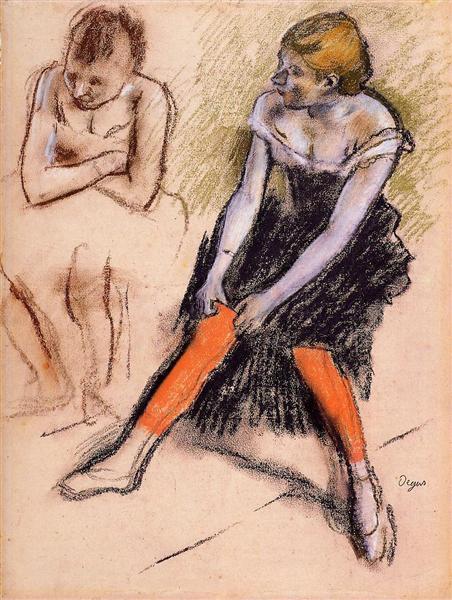Description
The painting "Ancer in Red Stockings" (1884) by Edgar Degas is a work that encapsulates the artist's mastery in the depiction of movement and everyday life. The painting is part of the rich tradition of Impressionism, often considered a revolution in the way of observing and depicting reality, taking the viewer into a more emotional and less strictly formal experience. In this painting, Degas delves into the world of ballet, a recurring theme in his work, and in his attention to detail and the depiction of the human body, he takes a perspective that is both intimate and powerful.
Visually, the work is centred on the figure of a young dancer, who stands in the foreground with remarkable virtuosity. Her dynamic posture and expression reflect a mixture of concentration and lightness, characteristic of dance. This figure is dressed in a light-coloured tutu, which contrasts vividly with the red tights that strikingly adorn her legs. The tights, of a deep red, act not only as an element of clothing, but also as a focal point within the composition that guides the viewer's gaze.
The use of colour in this work is significant. Degas employs a palette that allows the figure of the dancer to stand out whilst establishing a dialogue with the background, which is dark and subtly blurred. This creates an almost dreamlike atmosphere where the figure in the foreground seems to float in a kind of luminosity. The combination of light and shadow, so characteristic of Degas' style, imparts an emotional depth to the work, inviting the viewer to enter a world that is both magical and ephemeral.
The composition has a sense of movement that is characteristic of Degas' work. The emphasis on the dancer's poses and hands, along with careful attention to the draping of the tutu, echo the artist's deep interest in the dynamism of the body in action. Degas moves away from traditional static representation, and his ability to capture the sense of movement becomes a celebration of ballet itself.
Furthermore, the choice to depict a female figure in the context of ballet leads us to explore Degas’ relationship with the subject of dance. His works often portray women engaged in various activities, especially in moments of preparation or rest from the dance. This offers insight into the vulnerability and everydayness of dancers, who are often viewed from a perspective of admiration and detachment. Rather than idealizing the female form and figure, Degas presents these women in their humanity, showing both their strength and their fragility.
The technical aspects of the painting also demonstrate Degas' skill. His use of pastel and experimentation with loose brushstrokes gives the work a texture that seems to come to life. This approach has been instrumental in his artistic development, influencing numerous contemporaries and the evolution of modern art. The work can be compared to others in his repertoire, such as The Dance Class and Seventeen-Year-Old Dancer, where he also explores the interaction of human figures and movement, but Ancer in Red Stockings stands out for its bold use of colour and compositional strength.
In short, “Ancer in Red Stockings” is much more than just a portrait of a dancer; it is a testament to Degas’ artistic ingenuity and his ability to capture a moment of ephemeral beauty. Through his focus on color, composition, and movement, Degas continues to invite viewers to reflect on the nature of dance and the strength of the human body—a theme that resonates with impressive freshness even today.
KUADROS ©, a famous painting on your wall.
Hand-made oil painting reproductions, with the quality of professional artists and the distinctive seal of KUADROS ©.
Painting reproduction service with satisfaction guarantee. If you are not completely satisfied with the replica of your painting, we will refund 100% of your money.

